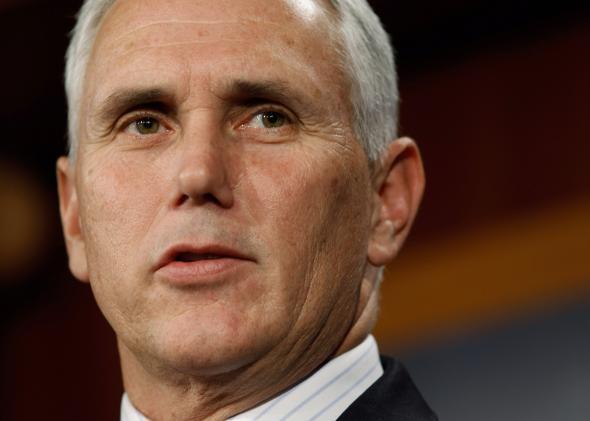In the latest controversy over religious liberty and gay rights, last week Indiana became the 20th state to enact a Religious Freedom Restoration Act. Many have denounced the law for inviting discrimination against gays and lesbians, and a number of organizations have threatened to move events out of Indiana or to limit their business in the state.
In signing the bill, however, Gov. Mike Pence dismissed this criticism. He declared that the law “is not about discrimination.” In an interview this weekend on ABC’s This Week, he added that the purpose of the law was to bolster First Amendment rights, not to discriminate. But this response indicates that the governor has either misunderstood or misrepresented a crucial aspect of the law he’s just signed.
Defending his state’s RFRA last week, Gov. Pence said: “If I thought it legalized discrimination in any way in Indiana, I would have vetoed it. In fact, it does not even apply to disputes between private parties unless government action is involved.” In other words, the governor implied, discrimination by a private individual or company against another private individual would not even implicate the new law. But that is simply false.
To see why it’s wrong to think that private businesses cannot raise the new law as a defense against civil rights claims, consider the recent case of a wedding photographer in New Mexico. Elane Photography offers wedding photography services to the public. Vanessa Willock emailed the company to inquire about the business’s availability to photograph the commitment ceremony she was planning with her partner, Misti Collinsworth.* Elane Photography’s lead photographer, Elaine Huguenin, wrote back and flatly told Willock that the company only photographs “traditional weddings,” not same-sex ceremonies. She later explained that her opposition to taking pictures of Misti and Vanessa’s big day was grounded in her Christian beliefs. The couple sued the photographer under the state’s anti-discrimination law, which protects gays and lesbians. Elane Photography countered that it had a religious freedom right to refuse service to the couple.
The New Mexico Supreme Court ruled for the couple. New Mexico has a RFRA that protects against substantial burdens on religious freedom. Crucially, however, the court held that New Mexico’s RFRA does not apply to suits between private parties—it only applies where the government is a party. For that reason, the court rejected Elane Photography’s religious freedom claim, sparking outrage among religious conservatives across the country. The Supreme Court declined to hear the case. Maybe what followed will not surprise you.
Compare Indiana’s newly minted RFRA to the one assessed by the court in New Mexico. The Indiana RFRA departs from New Mexico’s RFRA and the federal RFRA—on which many other state laws are modeled. How? Indiana’s RFRA expressly provides that a person can assert a “claim or defense in a judicial or administrative proceeding, regardless of whether the state or any other governmental entity is a party to the proceeding.”
This new statutory language is designed to ensure that a wedding photographer in Indiana would be protected if she discriminates against a same-sex couple, unlike the photographer in New Mexico who lost in court. The provision explicitly permits a private party, including a for-profit corporation, to challenge on religious grounds any claim of discrimination brought by another private party, even when the government is not otherwise involved in the case. In other words, when Gov. Pence said that his state’s law is just like RFRAs in other states and would not apply to disputes between private parties without government action, he was simply wrong about the law and its effect on future discrimination.
If Gov. Pence and the Indiana legislature are committed to showing that their law is not about discrimination, there is an obvious solution. They could amend the law to make it clear that protecting against discrimination in the commercial marketplace cannot be defeated by claims of religious freedom. If the law is not intended to protect discriminatory actions, it is hard to understand Indiana’s resistance to this proposal.
Just as Indiana was enacting its RFRA, conservative legislators in Georgia tabled that state’s religious freedom bill after a successful and bipartisan effort to amend the law in precisely this way, to protect civil rights laws. The authors of the Georgia RFRA were rather more candid in explaining that the amendment to protect against anti-discrimination “would completely undercut the purpose of the [RFRA] bill,” as one sponsor remarked. Why otherwise would they have effectively withdrawn it?
People of good faith can disagree about the merits of federal and state laws designed to protect religious freedom. In some cases, those laws can do important work to protect religious minorities. But recent efforts to pass state RFRAs do not strike an appropriate balance between the rights of religious believers and those who might be harmed when the state grants them exemptions from civil rights laws. The result is that the movement to protect religious minorities has come under a cloud of suspicion—it looks as though they are seeking license to discriminate. To lift that cloud, state legislators must provide stronger assurances that religious exemptions will not impose significant costs on others, especially in the context of employment discrimination and access to services and places of business open to the general public.
Of course, a good start to providing such assurances would be to tell the truth about the nature of the state’s new law. By misunderstanding or misrepresenting the content of Indiana’s RFRA, Gov. Pence has raised significant concerns about his state’s commitment to fundamental principles of anti-discrimination and equality.
*Correction, March 30, 2015: This piece originally misspelled Vanessa Willock’s family name.
Read more of Slate’s coverage of the Indiana Religious Freedom Restoration Act.
